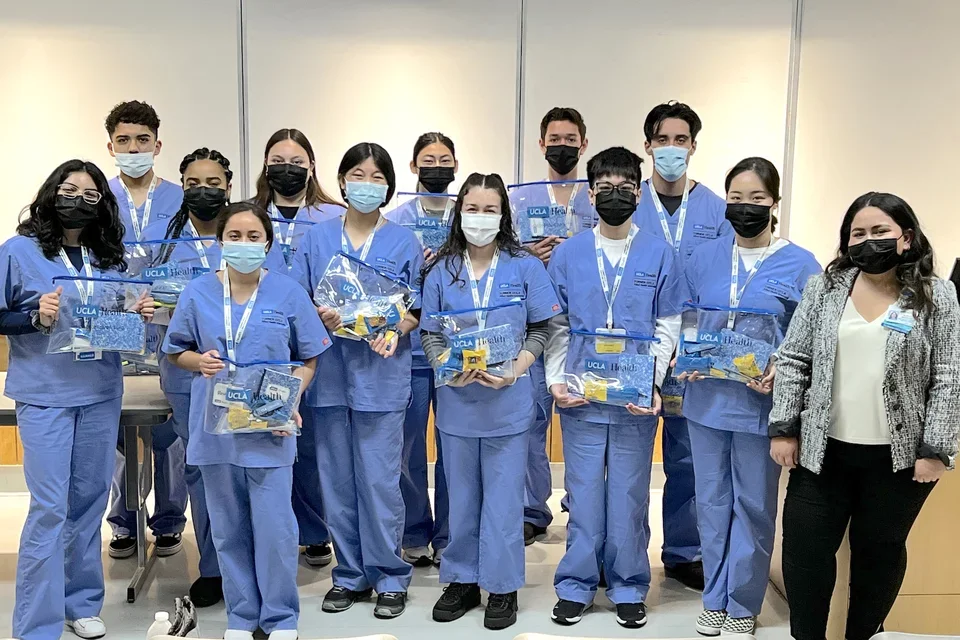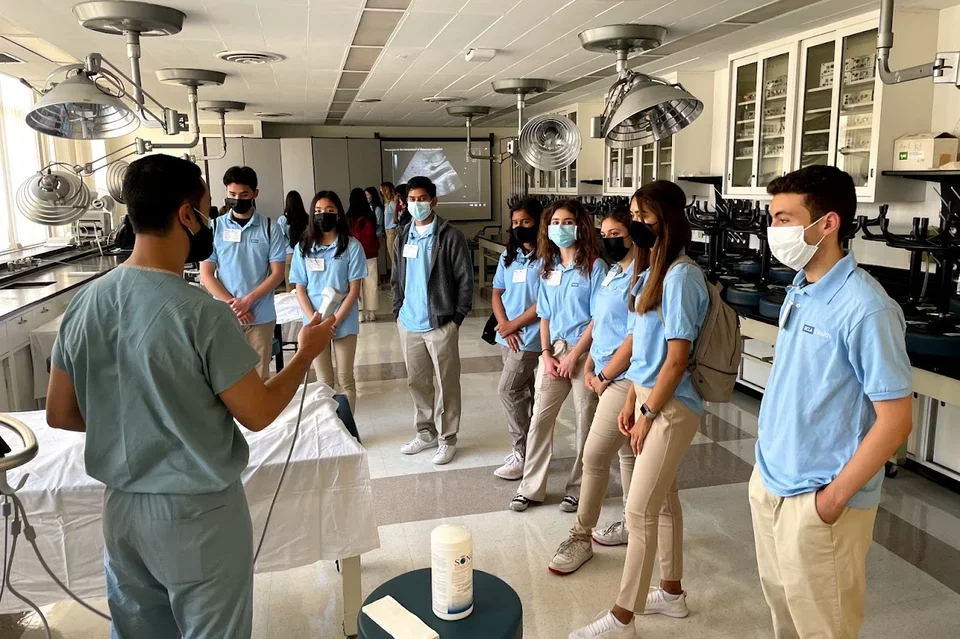Pipeline Programs

Pathways to careers in medicine, science and research starts here
K-12 Pipeline Programs
Generation Xchange
Aims to promote greater health and wellness outcomes in at-risk older adults, while simultaneously supporting greater academic and behavioral outcomes for children in grades kindergarten through 3rd grade.
The GenX Program places older community volunteers into grades K-3 elementary school classrooms to help students improve reading and math skills. Designed as a truly intergenerational program, GenX contributes to each generation it serves.The program promotes health in the older adult volunteers by appealing to their interest in children, drawing these adults participants into a structured program that provides social, physical, and cognitive activities. In turn, GenX seeks to improve academic and behavioral outcomes for children, with particular attention to support for reading proficiency. Successful educational trajectories have been shown to depend on learning to read by third grade (e.g., children who fail to achieve such proficiency are significantly more likely to drop out of school before they graduate from high school).
Family Medicine "Bridging the Gap" Program
The UCLA Family Medicine Residency program partners with local high schools in the communities it serves to bring role models and medical education to students. Open to all high school students interested in healthcare careers, the program’s ultimate goal is to develop future leaders in healthcare. We aim to build interest in the field of medicine and provide skill-building experiences that will help promote matriculation and retention in higher education and health sciences.
Long Beach Polytechnic High School Biomedical Research Program
Students with an interest in biomedical research enroll in a semester-long, for-credit honors program in which they receive instruction in experimental design, patient safety and ethics; and mentored research at one of the CTSI medical-research sites—either UCLA, Cedars-Sinai Medical Center or the Lundquist Institute for Biomedical Innovation at Harbor-UCLA Medical Center. High school seniors taking honors courses or advanced placement courses are eligible to enroll. The program accepts 10-17 students each year. The course is 21 weeks long, six hours per week consisting of activities at LB Poly and activities at one of the three medical centers. Activities at LB Poly include journal club, seminars, and biomedical ethics discussions.The course concludes with student presentations of each project at a poster presentation which is held at Cedars-Sinai.

Pre-Med Summer Scholar Program
The Pre-Med Summer Scholar Program is an intense, one-week, primarily educational program incorporating medical guest speakers and hospital-related tours and activities giving the Summer Scholar an involved sense of working within the field of medicine.

Turner-UCLA Allied Health Internship Program
The Turner UCLA Allied Health Internship is implemented by the UCLA Community Engagement Program, in partnership with Bobby and Lauren Turner, to provide learning opportunities for high school students and recent graduates in finding out more about careers in the entry-level, allied health professions. The one-week long, summer internship program is designed to address workforce shortages and offers career education for students who express interest in learning about health care career opportunities.
Undergraduate Pipeline Programs
Basic Dental Principles
The UCLA School of Dentistry's Basic Dental Principles (BDP) program offers undergraduate and post-baccalaureate students an opportunity to explore the field of dentistry through a structured, two-part experience. It begins with a two-quarter lecture series introducing students to various aspects of dentistry, taught by third-year UCLA dental students through a faculty-mentored teaching apprenticeship. Students who excel in the lecture series may continue to a hands-on laboratory course, led by second-year dental students, where they gain practical experience with dental techniques. The program is ideal for those seeking deeper insight into a potential career in dentistry.
UCLA Public Health Scholars Training Program
The UCLA Public Health Scholars Training Program provides undergraduate students the opportunity to explore the field of public health through hands-on training, structured workshops, group events, volunteering opportunities, and leadership and professional development. The program offers scholars the opportunity to train at UCLA, to explore public health in one of the most diverse counties in the US, and to experience the city’s vibrant culture. We work with community-based organizations, health systems, and government agencies to offer field placement opportunities for scholars that focus on public health.
UCLA/DREW Summer Health Professions Education Program (SHPEP)
The Summer Health Professions Education Program (SHPEP) is a free program for 1st and 2nd year educationally and economically disadvantaged undergraduate and community college students to explore their interests in medicine, dentistry, and nursing. Scholars participate in a six-week academic enrichment program where they develop competencies for becoming successful applicants to health profession programs, through specialized academic content, simulation activities, and mentorship. Our scholars become future leaders that will change the face of medicine, nursing, and dentistry and improve health care delivery, policy and research in underserved communities.
Professional Pipeline Programs
TL1 Summer Programs/Predoctoral Programs
This summer fellowship is an introduction to mentored research training for health professional students focusing on health systems science. The program will provide each individual with exposure to the practice of implementation science in clinical settings, public health program design and evaluation, community-partnered research, and health policy design, with a focus on population health. This fellowship will help students uncover lessons for translational research, specifically, implications for meeting the unique needs of entire populations and addressing health disparities.
MD Pipeline Programs
UCLA Pre-medical Enrichment Program (UCLA PREP)
The Pre-Medical Enrichment Program (PREP) is a free, six-week intensive summer program for educationally and economically disadvantaged 3rd and 4th year students and recent college graduates that are interested in strengthening their readiness to study medicine. Scholars engage in personal and professional development to enhance their passion for medicine and develop a community of peers to support them along their journey.
UCLA Re-Application Program (UCLA RAP)
The UCLA Re-Application Program (RAP) is a 11-month post-baccalaureate program from September to August. RAP is designed to assist promising California residents from educationally and economically disadvantaged backgrounds who were previously unsuccessful in gaining admissions to a U.S. Medical School. Enrollment in RAP is free of cost and scholars will be provided a stipend, however, scholars are responsible for their own living expenses during the program, and any associated costs and fees for post baccalaureate courses as part of their individualized re-application plan.